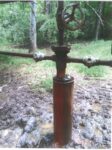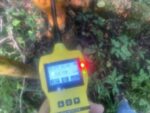It is illegal for a gas well owner to let gas leak from their wells or from their “gathering” lines that transport the gas from their wells to market. It is a violation of West Virginia Code §22-6-31. Under West Virginia Code §22-6-34 if the operator does not take care of the problem in “a reasonable period of time” West Virginia Department of Environmental Protection’s Office of Oil and Gas can bring civil fines up to $2500 per day and also the prosecutor can ask for misdemeanor criminal charge with penalties of up to $5000 and 12 month in jail. These Code sections are set out below.
So if you see this problem, contact an inspector of the Office of Oil and Gas and report the problem. If you are not satisfied with that, contact the Charleston main office of the Office of Oil and Gas (304-926-0450).
Be aware, if you are getting free gas from an old, relatively unproductive well you may want to balance your personal interest with the environmental and waste factors. If the cost of replacing the line is too much, the driller may decide that they would not make enough money from it with a new line to justify putting in a new line, and just turn off the well. If the driller turns off the well, they are supposed to plug it too. Plugging is expensive $10,000 or so, and maybe more. So they may decide a new line is cheaper than plugging. A less responsible driller may just turn it off and not plug it until the driller is forced to do so by the State, and you may have to force the State to force the driller to do it.
Any time you deal with issues like this:
1) Keep a diary! After you get passed around enough, you will lose track of which person agency you talked to when. And if you do get a runaround, and someone later doubts what you say you have done, showing them your diary will be very effective in getting them to take you seriously.
2) Get and write down in your diary the names of ALL of the people you talk to, and the names of their agencies (they all sound alike to beginners), and their phone numbers.
3) Take pictures! You do not want to consume your energy and time arguing that, yes, there really is a problem. It is hard for the other side to argue whether there is a problem if you have a picture of it! So take a picture to avoid that argument and get on to what can be done about it. Take several. Some from up close. Some from further back – it is hard for someone who has never been there to put your closeups in context. These days, digital pictures are the best. You can e-mail them to agencies to complain, and make all the copies you need. In this particular case, try to find some way to show that gas actually leaking. Bubbles in the stream? Put soapy water on a land leak and show the bubbles? Take a short video with a digital camera showing the grass shaking? Whatever.
You may also want to contact the mineral owner and let them know that their gas and their 1/8 royalty is leaking into the atmosphere. They may have rights against the gas well owner that will force the problem to be fixed.
WEST’S ANNOTATED CODE OF WEST VIRGINIA
CHAPTER 22. ENVIRONMENTAL RESOURCES
ARTICLE 6. OFFICE OF OIL AND GAS; OIL AND GAS WELLS; ADMINISTRATION; ENFORCEMENT
Current through End of 2006 First Ex. Sess.
§ 22-6-31. Preventing waste of gas; plan of operation required for wasting gas in process of producing oil; rejection thereof
Natural gas shall not be permitted to waste or escape from any well or pipeline, when it is reasonably possible to prevent such waste, after the owner or operator of such gas, or well, or pipeline, has had a reasonable length of time to shut in such gas in the well, or make the necessary repairs to such well or pipeline to prevent such waste: Provided, That (a) if, in the process of drilling a well for oil or gas, or both, gas is found in such well, and the owner or operator thereof desires to continue to search for oil or gas, or both, by drilling deeper in search of lower oil or gas-bearing strata, or (b) if it becomes necessary to make repairs to any well producing gas, commonly known as “cleaning out,” and if in either event it is necessary for the gas in such well to escape therefrom during the process of drilling or making repairs, as the case may be, then the owner or operator of such well shall prosecute such drilling or repairs with reasonable diligence, so that the waste of gas from the well shall not continue longer than reasonably necessary, and if, during the progress of such deeper drilling or repairs, any temporary suspension thereof becomes necessary, the owner or operator of such well shall use all reasonable means to shut in the gas and prevent its waste during such temporary suspension: Provided, however, That in all cases where both oil and gas are found and produced from the same oil and gas-bearing stratum, and where it is necessary for the gas therefrom to waste in the process of producing the oil, the owner or operator shall use all reasonable diligence to conserve and save from waste so much of such gas as it is reasonably possible to save, but in no case shall such gas from any well be wasted in the process of producing oil therefrom until the owner or operator of such well shall have filed with the director a plan of operation for said well showing, among other things, the gas-oil production ratio involved in such operation, which plan shall govern the operation of said well unless the director shall, within ten days from the date on which such plan is submitted to the director, make a finding that such plan fails, under all the facts and circumstances, to propose the exercise of all reasonable diligence to conserve and save from waste so much of such gas as it is reasonably possible to save, in which event production of oil at such well by the wasting of gas shall cease and desist until a plan of operation is approved by the director. Successive plans of operation may be filed by the owner or operator of any such well with the director.
§ 22-6-34. Offenses; penalties
(a) Any person or persons, firm, partnership, partnership association or corporation who willfully violates any provision of this article or any rule or order promulgated hereunder shall be subject to a civil penalty not exceeding two thousand five hundred dollars. Each day a violation continues after notice by the division constitutes a separate offense. The penalty shall be recovered by a civil action brought by the division, in the name of the state, before the circuit court of the county in which the subject well or facility is located. All such civil penalties collected shall be credited to the general fund of the state.
(b) Any person or persons, firm, partnership, partnership association or corporation willfully violating any of the provisions of this article which prescribe the manner of drilling and casing or plugging and filling any well, or which prescribe the methods of conserving gas from waste, shall be guilty of a misdemeanor, and, upon conviction thereof, shall be punished by a fine not exceeding five thousand dollars, or imprisonment in jail for not exceeding twelve months, or both, in the discretion of the court, and prosecutions under this section may be brought in the name of the state of West Virginia in the court exercising criminal jurisdiction in the county in which the violation of such provisions of the article or terms of such order was committed, and at the instance and upon the relation of any citizens of this state.




